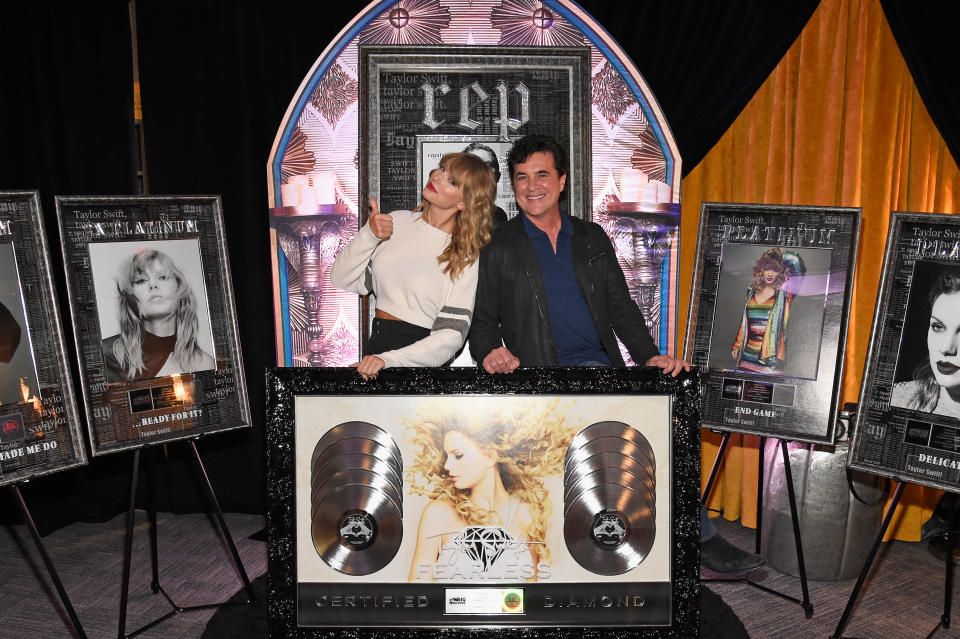‘That wasn’t her decision’: Why Taylor Swift’s record label beef misses the point
Taylor Swift is not happy with the sale of her former label, Big Machine Label Group, to mega-manager Scooter Braun’s Ithaca Holdings.
Braun’s $300 million acquisition of the Nashville-based label is being financed by the Carlyle Group (CG), which took a minority stake in Ithaca in 2017. With Carlyle’s backing, Ithaca is estimated to be worth around $800 million.
In a Tumblr post, Swift cites years of “incessant, manipulative bullying” at the hands of Braun as the reason she is upset with his taking control of her six-album catalog under Big Machine. But that is a moot point, according to one industry expert.
“She doesn’t like that Scooter Braun will now control the destiny of her back catalogue, but that wasn’t her decision to make,” Larry Miller, director of the music business program at NYU’s Steinhardt School, told Yahoo Finance.

“Fundamentally, here is the trade that artists make who sign a traditional record deal,” Miller added. “In return for taking the risk of signing — whether they’re a new artist or an established artist — the label retains control of sound recordings under that agreement. The artist’s work becomes the property of the label.”
Braun manages a slate of popular artists including Ariana Grande and Justin Bieber. He also managed Kanye West at the time the rapper and Swift clashed over West’s portrayal of her in the lyrics and the music video for the 2016 song “Famous.”
Swift directly cites the way West, Kim Kardashian West, Bieber, and Braun treated her during this time in her Tumblr post, which also compared the acquisition deal with her “worst nightmares.”

Swift had ‘every opportunity’ to get masters back
In 2018, Swift’s label agreement with Big Machine was set to expire, and the singer told label president Scott Borchetta she would be exploring other companies. Swift ultimately settled on Universal Music Group’s Republic Records (VIVHY). For the extent of her original contract, Universal acted as distributor for BMLG, so the company was already familiar with Swift’s body of work Miller points out.
The singer writes that she “learned about Scooter Braun’s purchase of my masters as it was announced to the world,” and went on to list what she claims are instances of bullying perpetuated by his clients. Including a phone call that Kardashian West recorded that appears to feature Swift signing off on “Famous.”
Borchetta pushed back on the claim that Swift was unaware of the deal, which was first reported on by the Wall Street Journal on Sunday.

In a blog post, Borchetta writes that he extended the courtesy of giving Swift a heads up about the deal with Braun via text. Similarly, he says Swift gave him the same courtesy prior to announcing her deal with UMG. Borchetta also claimed Swift’s father Scott was aware of the deal, having taken part in a shareholders’ call last week. Swift’s representatives have refuted this, claiming the father did not want to have information he would have to withhold from his daughter.
HuffPost U.K. entertainment reporter Daniel Welsh told YFi AM simply that “it's essentially a case of a big label versus Taylor Swift, and it is kind of hard to know who is telling the truth.”
Welsh breaks down the timeline and the controversy of the deal here.
In his blog post, Borchetta detailed the proposal BMLG offered to Swift at the time she was shopping for a new deal last summer. As part of a new 10-year contract, the label was willing to turn over the rights to Swift’s masters. Swift and her team requested the obligation be lessened to seven years, and the two sides never reached an agreement.

“They included offering her back 100% ownership of...everything that they had the rights to and enter into a new agreement,” Miller explains. “She had every opportunity to re-sign with Big Machine and get all of her masters back.”
Under the agreement with Republic, Swift retains the rights to any new music released, including the forthcoming “Lover.” Braun’s Ithaca Holdings will retain the rights to her six previous albums.
‘Taylor claims that she doesn’t like that person’
In the past, artists haven’t had much choice in how their bodies of work are handled, having signed to traditional label deals, much like that which Swift wanted to get out of with BMLG. When a major label holds the archives of hundreds of musicians, those artists don’t have much, if any, say in how the masters — in both their physical and their intellectual property forms — are maintained.
So it seems that Swift has turned a business transaction personal.
Swift reportedly did not want to re-sign with BMLG for fear of being sold off to another label. Miller explained that once it was clear the label’s biggest artist would be leaving, “It became a foregone conclusion that Big Machine would sell to someone.
“Unfortunately,” Miller added, “Taylor claims that she doesn’t like that person.”
Katie is an associate editor at Yahoo Finance. Follow her on Twitter.
Read More:
Follow Yahoo Finance on Twitter, Facebook, Instagram, Flipboard, SmartNews, LinkedIn, YouTube, and reddit.